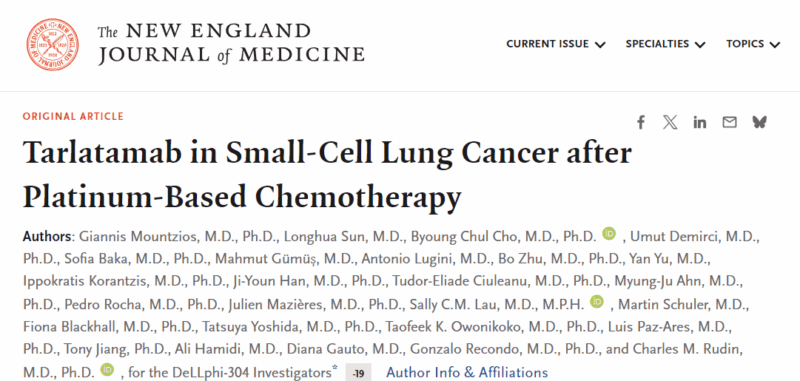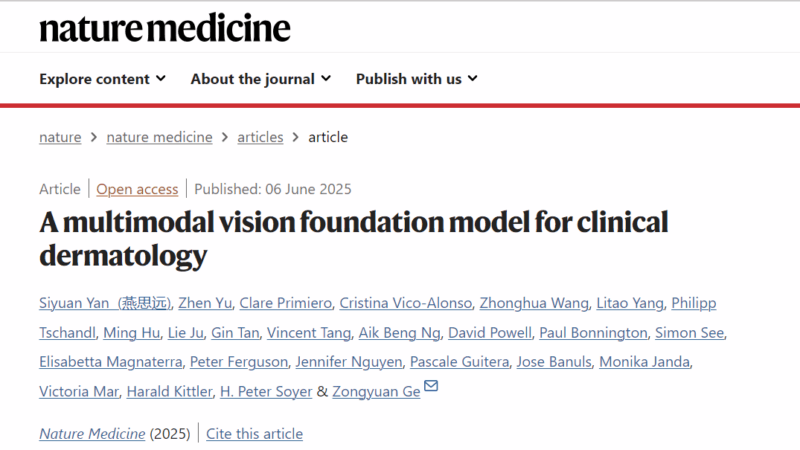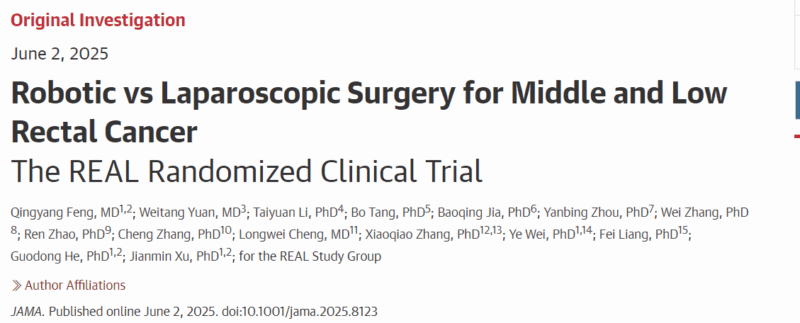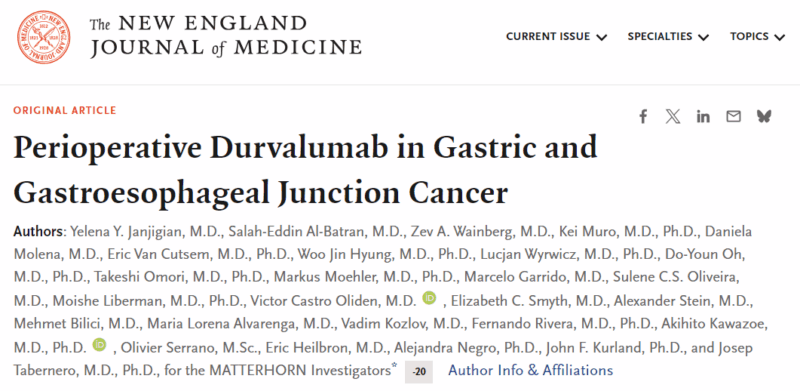Samuel Hume, Fellow at The Foulkes Foundation and pursuing PhD in the University of Oxford’s Department of Oncology, shared a post on X:
“Top 5 advances in medicine this week
1. A drug that beats chemotherapy in a subset of lung cancers
Small cell lung cancer is usually treated with chemotherapy, but resistance is common, and side-effects can be severe
Tarlatamab is a bispecific antibody: it recruits T cells directly to cancer cells – via a protein expressed by ~90% of small cell lung cancers (called DLL3)
Tarlatamab has accelerated approval to treat small cell lung cancer as second line after platinum chemotherapy – this phase 3 trial provides the data to (potentially) upgrade this to full approval
Tarlatamab improved overall survival vs. physician’s choice of chemotherapy, with fewer grade 3 adverse events (though with a new side-effect – cytokine release syndrome)
Ongoing phase 3 trials are testing Tarlatamab as part of first-line combinations”
Title: Tarlatamab in Small-Cell Lung Cancer after Platinum-Based Chemotherapy
Authors: Giannis Mountzios, Longhua Sun, Byoung Chul Cho, Umut Demirci, Sofia Baka, Mahmut Gümüş, Antonio Lugini, Bo Zhu, Yan Yu, Ippokratis Korantzis, Ji-Youn Han, Tudor-Eliade Ciuleanu, Myung-Ju Ahn, Pedro Rocha, Julien Mazières, Sally C.M. Lau, Martin Schuler, Fiona Blackhall, Tatsuya Yoshida, Taofeek K. Owonikoko, Luis Paz-Ares, Tony Jiang, Ali Hamidi, Diana Gauto, Gonzalo Recondo, Charles M. Rudin
You can read the Full Article on The New England Journal of Medicine

“2. An AI that improves diagnosis by dermatologists
Widespread AI models for dermatology could speed up and improve diagnosis
This model (‘PanDerm’) can analyse all forms of dermatology image: ordinary photos, dermoscopy, total-body photography, and pathology slides
PanDerm raises the accuracy of diagnosis when assisting doctors – both generalists and dermatologists
It’s only validated on ~200 of the >1,000 skin conditions, so this needs to be expanded, and clinical trials in the real-world are needed before widespread use”
Title: A multimodal vision foundation model for clinical dermatology
Authors: Siyuan Yan, Zhen Yu, Clare Primiero, Cristina Vico-Alonso, Zhonghua Wang, Litao Yang, Philipp Tschandl, Ming Hu, Lie Ju, Gin Tan, Vincent Tang, Aik Beng Ng, David Powell, Paul Bonnington, Simon See, Elisabetta Magnaterra, Peter Ferguson, Jennifer Nguyen, Pascale Guitera, Jose Banuls, Monika Janda, Victoria Mar, Harald Kittler, H. Peter Soyer, Zongyuan Ge
You can read the Full Article on Nature Medicine

“3. Robotic surgery beats keyhole surgery in rectal cancer
Robotic instruments can bend and rotate – which makes working in the narrow pelvis easier than with standard keyhole (laparoscopic) instruments
This randomized-controlled trial tested formally whether robotic beats keyhole surgery, in middle-low rectal cancer
Robotic surgery reduced the risk of cancer recurrence vs. keyhole surgery – and led to fewer bladder, sexual and bowel problems following surgery
All patients were from one country (China), so trials in more countries would be needed to generalise the findings, and wider robotic surgery training is needed for widespread use”
Title: Robotic vs Laparoscopic Surgery for Middle and Low Rectal Cancer
Authors: Qingyang Feng, Weitang Yuan, Taiyuan Li, Bo Tang, Baoqing Jia, Yanbing Zhou, Wei Zhang, Ren Zhao, Cheng Zhang, Longwei Cheng, Xiaoqiao Zhang, Ye Wei, Fei Liang, Guodong He, Jianmin Xu
You can read the Full Article on JAMA Network

“4. Immunotherapy might improve outcomes in early gastric cancer
Resectable gastric cancer is usually treated with chemotherapy, surgery, then chemotherapy again
This phase 3 trial tested whether adding Durvalumab (a PDL1 antibody) – to stimulate the immune system – can improve outcomes
Durvalumab increased disease-free survival, and tripled complete responses, without delaying surgery – though whether this improves overall survival isn’t yet known
The side-effect profiles were similar, but PDL1 inhibition doubled the risk of immune-mediated side effects
Whether both pre- and post-op Durvalumab are necessary isn’t known, so that’s being tested next”
Title: Perioperative Durvalumab in Gastric and Gastroesophageal Junction Cancer
Authors: Yelena Y. Janjigian, Salah-Eddin Al-Batran, Zev A. Wainberg, Kei Muro, Daniela Molena, Eric Van Cutsem, Woo Jin Hyung, Lucjan Wyrwicz, Do-Youn Oh, Takeshi Omori, Markus Moehler, Marcelo Garrido, Sulene C.S. Oliveira, Moishe Liberman, Victor Castro Oliden, Elizabeth C. Smyth, Alexander Stein, Mehmet Bilici, Maria Lorena Alvarenga, Vadim Kozlov, Fernando Rivera, Akihito Kawazoe, Olivier Serrano, Eric Heilbron, Alejandra Negro, John F. Kurland, Josep Tabernero
You can read the Full Article on The New England Journal of Medicine

“5. Early stages of an upgraded method to remove clots
Thrombectomy (mechanical removal of clots) is effective to treat ischaemic stroke and other conditions caused by blood clots
Current methods (aspiration/stent remover) often fail on large, tough clots – in up to 30% of patients
This ‘milli-spinner’ shrinks tough clots to 5% of their original size – by spinning to induce compression and shear forces – then removes them by aspiration
In models and pig arteries, it was better than current thrombectomy techniques, but it hasn’t been tested in vessels in the brain or lung yet – nor in humans – so that’s next”
Title: Milli-spinner thrombectomy
Authors: Yilong Chang, Shuai Wu, Qi Li, Benjamin Pulli, Darren Salmi, Paul Yock, Jeremy J. Heit, Ruike Renee Zhao
You can read the Full Article on Nature

More posts featuring Samuel Hume.


